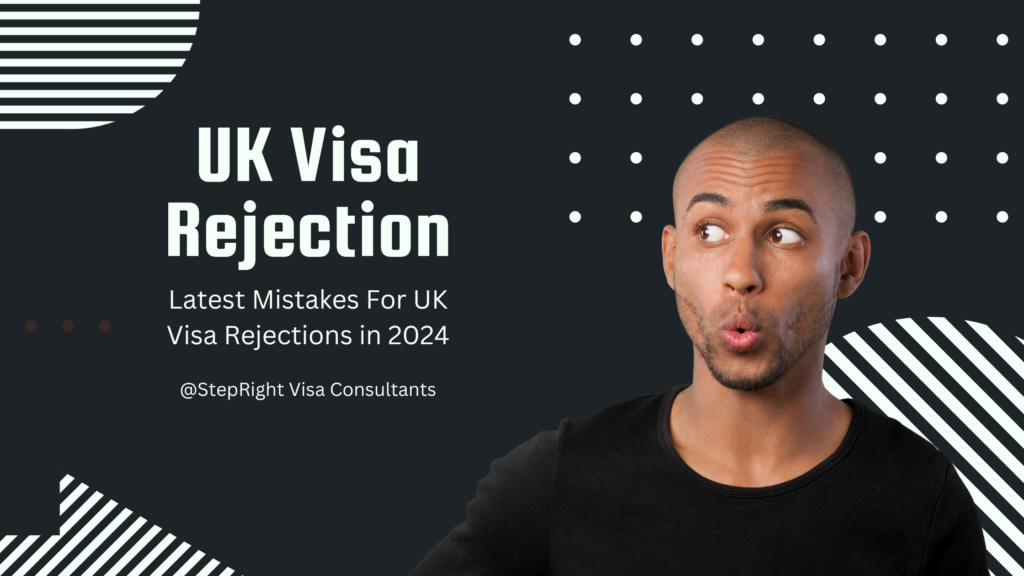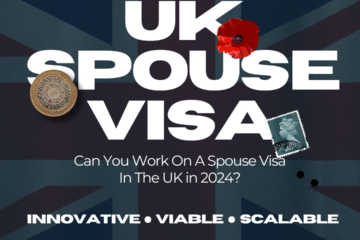Latest Mistakes For UK Visa Rejections in 2024

Common mistakes and errors in UK visa applications can range from simple spelling mistakes or typos to more serious issues that could impact the outcome of the application. These mistakes can be categorized into innocent mistakes, which are unintentional errors like typos or incorrect dates, and deliberate deceptions, which involve providing false information or withholding relevant details. Innocent mistakes, if identified as such, may not necessarily lead to application refusal. However, deliberate deceptions, such as failing to disclose criminal convictions or providing false documents, can result in immediate visa refusal, revocation, or even a ban on future applications. It is crucial to provide accurate and truthful information on visa applications to avoid complications and ensure a smooth process.
Common UK Visa Application Mistakes
When applying for a UK visa, it is essential to avoid mistakes to ensure a favorable decision. Mistakes can range from innocent oversights to deliberate attempts to deceive the visa authorities. Here are some common mistakes and how to handle them:
Innocent Mistakes:
- Typo errors: A simple spelling mistake can lead to unpredictable issues. Ensure all details supplied are accurate, and the supporting documents align with the stated information.
- Incorrect postcode or address: Double-check your address details to avoid confusion.
- Wrong dates and figures: Be careful with dates and figures, such as income or employment details, to avoid discrepancies.
Deliberate Deceptions:
- Failure to disclose material facts: This includes not declaring a criminal conviction, previous travel to the UK, presence of family members in the UK, or a visa refusal.
- False documents: Providing false documents, such as false documents provided by the applicant or by another person, can lead to serious consequences.
- Evidence opposing the information stated in the application form: If evidence submitted contradicts the information provided in an application form, it may be considered deception.
If you discover a mistake after submission, take immediate steps to rectify it. Contact Step Right Visa Consultants for UK Visas and follow their instructions to correct the error. If the mistake is severe, it may lead to the refusal of your visa application or even a ban on future applications.
What is ‘Innocent Mistake’?
An ‘Innocent Mistake’ in the context of a UK visa application is distinguished from false representations by the Home Office. The Home Office guidance, Suitability: false representations, deception, false documents, nondisclosure of relevant facts Version 4.0, as published on 14 November 2023, outlines factors to determine if a mistake is innocent. These factors include assessing how easy it would be to make an innocent mistake, the likelihood that the applicant was unaware of the incorrect information provided, whether the false information benefits the applicant, and whether other answers or documents contradict the false information. Innocent mistakes are typically minor inaccuracies, such as spelling errors, incorrect postcodes, or immaterial inaccuracies like a misspelled name. However, if a mistake affects the eligibility criteria for a visa, it may prompt a refusal. The severity of the mistake plays a crucial role in determining the outcome of the application, and decision-makers have the discretion to consider an error as an innocent mistake rather than a false representation, even if it leads to a refusal.
How to determine if a Mistake is ‘Innocent’ in UK Visa Application
The relevant factors in determining if a mistake in a UK visa application is ‘innocent’ include several key considerations outlined in the Home Office guidance:
1.Ease of Making an Innocent Mistake: Decision makers assess how easy it would be to make an innocent mistake in the given circumstances.
2.Applicant’s Awareness: The likelihood that the applicant was unaware that incorrect information was provided is considered.
3.Awareness of Incorrect Information: Evaluation of whether the applicant or the person providing the information was aware that the information provided was incorrect.
4.Benefit to the Applicant: Determining if the false information provided benefits the applicant in any way.
5.Consistency with Other Answers: Checking if the false information contradicts other answers on the application form or any information in previous applications.
6.Endorsements or Stamps: Examining if any endorsements or stamps in the passport or ID document contradict the answers given.
7.New Passport Presentation: Assessing why a new passport has been presented, if applicable.
8.Consistency with Previous Applications: Considering if this ‘innocent mistake’ has also been made on a previous application.
By evaluating these factors, decision-makers can determine whether a mistake in a visa application should be classified as an ‘innocent mistake’ rather than a false representation, which can have significant implications on the outcome of the application.
How can I correct an innocent mistake in my UK visa application
To correct an ‘innocent mistake’ in your UK visa application, it is essential to take prompt and appropriate action. Here are the steps you can follow based on the information provided in the sources:
- Act Promptly: As soon as you realize there is an error in your submitted application, it is crucial to act promptly. Notify the Home Office about the mistake without delay.
- Contact Step Right Visa Consultant: Reach out to StepRight Visa Consultants, which is responsible for visa applications, to inform them of the error. Depending on the nature of the mistake, you may need to request an amendment or cancellation of your application.
- Nature of Error: If the mistake is minor, such as a spelling error or a typo, you may be able to request a simple correction from StepRight Visa Consultants. However, if the error goes to the core of your application, you might need to ask for your application to be canceled so you can reapply.
- Provide Correct Information: Ensure that you provide the correct and accurate information needed to rectify the mistake. Be transparent and cooperative in addressing any errors.
- Seek Legal Advice: If you are unsure about how to proceed or if the mistake is significant, consider seeking professional legal advice from an immigration lawyer. They can guide you on the best course of action.
- Review Supporting Documents: Check all supporting documents to ensure they align with the corrected information in your application. Consistency between your application form and supporting documents is crucial.
- Refund Consideration: Depending on the stage of your application and the nature of the mistake, you may inquire about a refund if applicable.
By following these steps and ensuring that any innocent mistakes are promptly corrected with accurate information provided to the Home Office,you can address errors in your UK visa application effectively and increase your chances of a successful outcome.
What documentation is required to correct an innocent mistake in a UK visa application
To correct an innocent mistake in a UK visa application, specific documentation may be required to support the correction process. Based on the information provided in the sources, here are the key documents that may be necessary:
Cover Letter: Draft a clear and concise cover letter addressed to the Home Office explaining the error in your application. Include your application reference number at the top of the letter and provide a straightforward explanation of the mistake along with accurate information.
Supporting Documents: If you have any additional documents that can substantiate your claim of a genuine error, submit them along with your cover letter. For instance, if there was an error in financial details, include correct bank statements or any relevant supporting evidence to rectify the mistake.
Legal Advice Correspondence: If you have sought legal advice from an immigration lawyer regarding the mistake in your application, any correspondence or advice received from them may also be beneficial to include as part of your documentation to demonstrate that you are taking appropriate steps to rectify the error
Relevant Application Forms: Depending on the nature of the mistake, you may need to provide corrected or updated application forms reflecting the accurate information to ensure consistency and transparency in your application
By compiling and submitting these essential documents along with a cover letter explaining the innocent mistake in your UK visa application, you can effectively communicate with the Home Office and increase the likelihood of successfully correcting errors without facing adverse consequences related to false representations or deception.
What are some examples of innocent mistakes that can be corrected in a UK visa application?
Some examples of innocent mistakes that can be corrected in a UK visa application include minor inaccuracies that do not impact the eligibility requirements for the visa. Here are some specific examples based on the information provided in the sources:
1.Typographical Errors: Minor errors such as misspelling a name or providing an incorrect postcode are considered innocent mistakes that should not prompt a refusal if they do not affect the eligibility criteria.
2.Income Discrepancies: An innocent mistake could involve providing incorrect income information, where the higher figure stated was unintentional and not supported by evidence. However, if the mistake does not align with the evidence provided, it may still lead to a refusal based on eligibility.
3.Failure to Disclose Minor Details: Inadvertently omitting minor details like previous travel history to the UK, the presence of family members in the UK, or a visa refusal can be considered innocent mistakes if they are not intentional and do not mislead the authorities.
4.Incorrect Document Submission: Submitting incorrect or irrelevant documents by mistake can also be classified as an innocent error if it was not done with the intention to deceive and does not significantly impact the application’s assessment.
5.Unintentional False Information: Providing false information due to misunderstanding a question or unintentional oversight can be considered an innocent mistake if it does not alter the overall accuracy of the application.
By recognizing these examples of innocent mistakes and promptly correcting them when identified, applicants can address minor errors in their UK visa applications and improve their chances of a successful outcome without facing serious consequences related to false representations or deception.
Distinguishing an ‘Innocent Mistake’ From a ‘False Representation’
The distinction between an ‘innocent mistake’ and a ‘false representation’ in a UK visa application is crucial for understanding the implications of errors made in the application process. The Home Office guidance in Suitability: false representations, deception, false documents, nondisclosure of relevant facts Version 4.0, as published on 14 November 2023, provides a framework for determining whether a mistake is innocent or not. An ‘innocent mistake’ is a mistake made without any element of dishonesty or deception. It is a mistake that is not intended to mislead or deceive the authorities. In contrast, a ‘false representation’ is a deliberate attempt to mislead or deceive the authorities by providing false information. To determine if a mistake is innocent, the Home Office guidance considers several factors:
- How easy would it be to make an innocent mistake?
- How likely is it that the applicant was unaware of the incorrect information provided?
- How likely is it that the applicant, or the person providing the information, was aware that the information was incorrect?
- Does the false information benefit the applicant?
- Is it contradicted by other answers on the application form or by any information in any documents provided with the current or previous application?
- Does any endorsement or stamp in the passport or ID document contradict any answer given?
- Has a new passport been presented, and if so, why?
- Has this ‘innocent mistake’ also been made on a previous application?
Suppose there is reason to suspect a false representation has been made in a visa application. In that case, decision-makers are required first to consider whether an innocent mistake has, or could have, been made. If an innocent mistake is identified, the decision maker must not refuse a visa on grounds of false representations. However, if the mistake is deemed to be a false representation, the decision maker has the discretion to refuse the visa application.
What is the difference between an innocent mistake and a false representation in a UK visa application?
An innocent mistake in a UK visa application refers to a mistake made without any element of dishonesty or deception. It is a mistake that is not intended to mislead or deceive the authorities. In contrast, a false representation is a deliberate attempt to mislead or deceive the authorities by providing false information. The Home Office guidance distinguishes between these two types of mistakes, as a finding of false representations can have serious consequences for a pending application, future applications, and even the applicant’s current immigration status in the UK.
To determine if a mistake is innocent, the Home Office guidance considers factors such as how easy it would be to make an innocent mistake, how likely it is that the applicant was unaware of the incorrect information, whether the false information benefits the applicant, and if it is contradicted by other answers or documents provided. Innocent mistakes typically involve minor, immaterial inaccuracies, such as spelling errors or incorrect postcodes, which should not prompt a refusal on the grounds of false representations. However, if a mistake prompts the decision maker to believe that the requirements for a visa are not met in full, it may lead to a refusal.
In the context of UK visa applications, an innocent mistake should not prompt a mandatory refusal on the grounds of false representations. While it may still result in a refusal of eligibility, a decision-maker can consider it an innocent mistake rather than a false representation. This is because the severity of the mistake made is an important factor in determining the outcome of a case. Even if a mistake results in an application being refused, it is still possible for a decision-maker to consider it an innocent mistake rather than a false representation.
What are some examples of false representations that can give rise to a discretionary power of refusal in a UK visa application?
Examples of false representations that can give rise to a discretionary power of refusal in a UK visa application include:
1.Providing inaccurate financial information, such as inflating income or assets on bank statements to meet financial requirements.
2.Misrepresenting employment status or history to enhance the chances of visa approval.
3.Falsifying educational qualifications or certifications to meet visa eligibility criteria.
4.Concealing previous visa refusals or travel bans from other countries.
5.Submitting false documents, such as forged bank statements or employment letters, to support the visa application.
6.Providing misleading information about the purpose of the visit or the intended length of stay in the UK.
These examples highlight the importance of providing accurate and truthful information in a visa application to avoid the risk of refusal based on false representations, which can have serious consequences not only on the current application but also on future visa applications and immigration status.
What is the role of the UK home office in determining whether a false representation has been made in a visa application?
The UK Home Office plays a crucial role in determining whether a false representation has been made in a visa application. When assessing visa applications, the Home Office scrutinizes the information provided by the applicant to ensure its accuracy and truthfulness. If the Home Office suspects that a false representation has been made, they have the responsibility to investigate further and gather evidence to support their allegations of dishonesty or deception. The Home Office follows a standard of proof known as the ‘balance of probabilities,’ meaning they need to demonstrate that it is more likely than not that the applicant intentionally made a false representation. This process involves assessing discrepancies in the information provided by the applicant, comparing it with data from other sources, and evaluating the integrity of documents submitted. In cases where false representations are alleged, the burden of proof shifts to the Home Office to show that the representations are untrue and that there is an element of dishonesty or deception involved. The Home Office must provide evidence to support their claims of false representations, and they must afford the applicant an opportunity to respond to these allegations before deciding on the application. Ultimately, the Home Office’s role is to ensure the integrity of the visa application process by thoroughly investigating any suspected false representations and making decisions based on the evidence presented. If false representations are proven, the Home Office has the authority to refuse the application on the grounds of false representations, which can have significant implications for the applicant’s immigration status and future applications.
Contact Step Right Visa Consultants
For expert advice in relation to a UK visa application or an immigration appeal, contact Step Right Visa Experts on +971 544510607 or complete our enquiry form steprightdcs.com
It is advisable to provide detailed information by filling a form on a website about your situation to receive tailored advice and guidance on your UK visa application or immigration appeal.



0 Comments